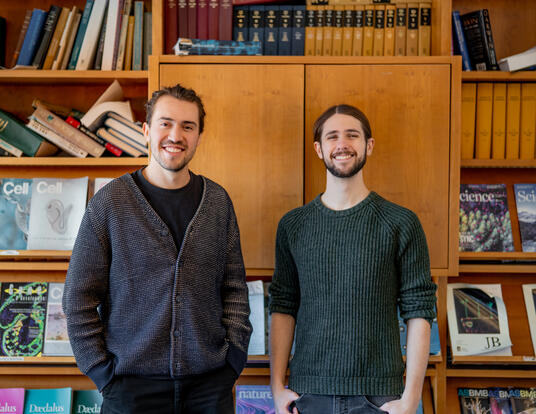Identity as a Superpower
How engagement with race and ethnicity leads to greater student success

Research at Risk: Since World War II, universities have worked with the federal government to create an innovation ecosystem that has yielded life-changing progress. Now much of that work may be halted as funding is withdrawn. Find out more about the threats to medical, engineering, and scientific research, as well as how Harvard is fighting to preserve this work—and the University's core values.
The thing Shandra Jones remembers most about growing up in an all-Black working-class community in Prichard, Alabama, is the joy: playing kickball with makeshift bases in the street near where she lived with her mother Susie Montgomery while she and her friends waited for the school bus; shucking beans and corn from the unusually robust garden her godmother Mary Smith planted in the middle of the city; rubbing the legs and braiding the hair of her godfather Franklin D. Smith’s mother, whom she called “grandmama,” just like the woman’s blood relatives. She took the richness of her experience with her to Stanford University, where she became the first in her family to graduate from college, then to business school at the University of North Carolina, and finally to the Harvard Kenneth C. Griffin Graduate School of Arts and Sciences.
“There was so much beauty, strength, and benefit in that community,” Jones explains. “My goal is to understand that richness—how it is propelling and motivating—and to talk about it from the perspective of closing the racialized college success gap, as well as workforce development and holistic wellness.”
As a PhD candidate in human development, learning, and teaching, Jones explores the impact of ethnic and racial identity on student success. Her research finds positive outcomes for mental health and academic and career success among students exposed to curricula that ask them to engage deeply and thoughtfully with their race and ethnicity. In a word, identity in general—and Blackness in particular—can be a superpower.
An Asset-Based Approach to Student Success
Jones's PhD work emphasizes the strengths and resources inherent in racial and ethnic identity, framing it not as a barrier, but as a "propellant" for marginalized students. The approach emerged from her own experiences, both as a first-generation student at Stanford University and then at the University of North Carolina’s (UNC) Kenan-Flagler Business School, and then as a UNC administrator, where she developed admissions strategies focused on students from traditionally underrepresented populations.
"I found myself constantly questioning why certain strategies weren't working," Jones said. "What assumptions were we making about how students perceived themselves? What strengths within their identities might we be overlooking?"
At UNC Jones realized that she and her colleagues were gathering data on behaviors—completion rates, for example—that didn't tell them what students were thinking or how they felt about their identities. “There was a missing piece,” she says.
What assumptions were we making about how students perceived themselves? What strengths within their identities might we be overlooking?
—Shandra Jones
The search to find the missing piece in student success eventually brought Jones to PhD study at Harvard Griffin GSAS, where it underpins her desire to "lean into the strengths and resources that young people have, especially those related to their identities." Understanding these psychological dimensions, Jones asserts, can lead to better strategic decision-making in educational institutions, ultimately closing racialized completion gaps and fostering holistic student success.
The Identity Project Goes to College
Jones's dissertation explores the intersection of ethnic-racial identity and education. The three-part study focuses on The Identity Project, an evidence-based curriculum designed by Harvard Graduate School of Education Professor Adriana Janette Umaña-Taylor "to provide adolescents of any ethnic-racial background with tools and strategies that help them explore and understand their constantly evolving identity in relation to their race and ethnicity." Jones began with a comprehensive literature review, through which she proposed a new model of college student success—one that integrated ethnic-racial identity as a critical component.
"‘The Identity Project Goes to College’ [the title of her dissertation] aimed to see if the existing curriculum, successful with adolescents, could translate to older students,” Jones says. “The literature review was essential because it gave me a theoretical basis to argue for ethnic-racial identity's role in student success.”
To test her proposed model, Jones followed her literature review with a large-scale survey, collecting data from 755 undergraduate students across the US, ranging in age from 15 to 25 years old. The survey examined various indicators—such as emotional intelligence, academic engagement, and mental health—to see whether young people reported links between their ethnic-racial identity, emotional self- and social awareness, and their academic and psychosocial development as she had hypothesized. Umaña-Taylor says Jones’s results provide important insights into student success. The Identity Project's understanding of adolescent developmental processes with empirical and theoretical work focused on young adults’ post-secondary success.
"In addition to findings from her in-depth interviews, Shandra's preliminary findings from survey data suggest that curricula focused on young adults’ ethnic-racial identity development could meet important developmental needs for young adults and contribute positively to their academic outcomes," she says. "Her findings are particularly useful for considering the varied ways we can support college-attending students as they acclimate to new contexts and the modifications needed for existing interventions to make them feasible to implement in a college setting."
This phase of Jones’s dissertation work was supported in part by the Harvard and the Legacy of Slavery (H&LS) Initiative, which helped her to recruit Harvard participants for the survey. “There are many colleges represented by those 755 students,” she says. “Harvard is one of them and the H&LS grant specifically helped me enlist participants and provided funding for survey participation. It enabled me to expand the scope of this study.”
The final phase of Jones’s project was a feasibility pilot, which tested whether offering the identity-focused curriculum in college environments could work. Conducted as a voluntary extracurricular program, the pilot faced challenges, in part because of broader perceptions of the relevance of identity.
"The curriculum is built around dialogue and activities about race and ethnicity," she says. "But students perceived these topics as only relevant to those from minoritized backgrounds, even though the science clearly tells us these competencies are universal."
Despite these hurdles, the pilot underscored the importance and potential impact of her asset-based approach. "The findings suggest that institutional contexts matter greatly, and integrating these discussions into the fabric of student life would make a significant difference," Jones says.
An Engine, Not an Obstacle
As Jones prepares to graduate in May 2025, her ambition is to embed her research insights into strategic educational planning and decision-making. She envisions a future where her work on identity scales across multiple institutions, transforming not only individual campuses but also informing the policy of educational systems and other community-based, economic, and social-justice efforts.
"I'm excited to continue marrying research insights with strategy," Jones shares. "Whether in academia or nonprofit educational sectors, I aim to leverage my background to promote understanding of cultural strengths and resources."
Thinking about the future possibilities for her research, one near-term goal for Jones is to conduct a full-scale trial of The Identity Project across multiple college sites, given the diversity of institutional contexts and student bodies. She’s also particularly interested in exploring how ethnic-racial identity intersects with other identity dimensions, such as gender and sexual orientation, in fostering student success.
"I have pages of future studies in mind," Jones laughs. "But fundamentally, it’s about making sure that ethnic-racial identity is recognized as a strength, not just rhetorically but in practical, operational terms within educational systems."
Shandra's preliminary findings from survey data suggest that curricula focused on young adults’ ethnic-racial identity development could meet important developmental needs for young adults and contribute positively to their academic outcomes.
—Adriana Janette Umaña-Taylor
Sara Lawrence-Lightfoot Professor of Education at the Harvard Graduate School of Education
Jones’ interests run deep within education-success research and practice but are ultimately grounded in the notion that learning is a pathway for economic mobility, equity, and justice. Boston University Professor Anthony Jack, PhD ’16, another of Jones’s faculty mentors, says the PhD candidate’s work deepens our understanding of development throughout the course of life.
“Shandra reminds us that mobility is a lifelong enterprise and one that is shaped by the often fraught and troubled history of race in America,” he says. “Her research helps us unpack how taking affirmative steps to support students’ racial identity development not only promotes their academic resilience but also serves as a protective force for their socio-emotional well-being. We need this work now more than ever.”
Even as she looks to the future, Jones carries with her the passion and joy that shaped her upbringing in Prichard, Alabama. At its foundation is the notion that her identity—and the identities of all marginalized students—can be an extraordinary source of power and transformation.
"Growing up, I saw firsthand the richness of Black identity," she says. "It was an engine, not an obstacle, and that’s what I strive to communicate and instill through my work."
Get the Latest Updates
Join Our Newsletter
Subscribe to Colloquy Podcast
Simplecast





